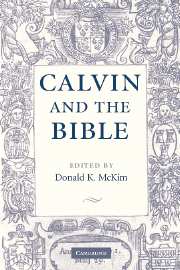Book contents
- Frontmatter
- Contents
- Notes on contributors
- Preface
- List of abbreviations
- 1 Calvin as commentator on Genesis
- 2 Calvin as commentator on the Mosaic Harmony and Joshua
- 3 Calvin as an interpreter of Job
- 4 Calvin as commentator on the Psalms
- 5 Calvin as commentator on the Prophets
- 6 Calvin as commentator on the Synoptic Gospels
- 7 Calvin as commentator on the Gospel of John
- 8 Calvin as commentator on the Acts of the Apostles
- 9 Calvin as commentator on the Pauline epistles
- 10 Calvin as commentator on Hebrews and the Catholic Epistles
- 11 John Calvin as an interpreter of the Bible
- Index
11 - John Calvin as an interpreter of the Bible
Published online by Cambridge University Press: 09 November 2009
- Frontmatter
- Contents
- Notes on contributors
- Preface
- List of abbreviations
- 1 Calvin as commentator on Genesis
- 2 Calvin as commentator on the Mosaic Harmony and Joshua
- 3 Calvin as an interpreter of Job
- 4 Calvin as commentator on the Psalms
- 5 Calvin as commentator on the Prophets
- 6 Calvin as commentator on the Synoptic Gospels
- 7 Calvin as commentator on the Gospel of John
- 8 Calvin as commentator on the Acts of the Apostles
- 9 Calvin as commentator on the Pauline epistles
- 10 Calvin as commentator on Hebrews and the Catholic Epistles
- 11 John Calvin as an interpreter of the Bible
- Index
Summary
When John Calvin published in 1540 his first commentary on the Bible, an interpretation of St. Paul's letter to the Romans, he joined a lively conversation that had been taking place in the Christian church ever since its inception. Paul's letter was itself a kind of commentary, a reinterpretation of stories and songs from the Old Testament, especially from Genesis and the book of Psalms. Paul was convinced that these ancient Hebrew writings had taken on a new meaning as a result of the death and resurrection of Jesus Christ.
His reinterpretation of older biblical traditions was itself reinterpreted by such stalwarts of the early church as Origen, Augustine, and John Chrysostom. Medieval interpreters repeated and revised these early insights and added their own, many of which were preserved in such standard exegetical works as the Glossa ordinaria and the Postilla of Nicholas of Lyra. By 1540 there was a substantial body of literature on Romans, including several recent works by Calvin's contemporaries. Aspiring commentators, confronted by this body of exegetical literature, might well have been forgiven if they had wondered whether there was anything fresh to say about Romans. Calvin concluded there was, but not before he had read a generous sample of the exegetical tradition, including the impressive commentaries by Philip Melanchthon, Heinrich Bullinger, and Martin Bucer.
- Type
- Chapter
- Information
- Calvin and the Bible , pp. 282 - 291Publisher: Cambridge University PressPrint publication year: 2006
- 4
- Cited by

